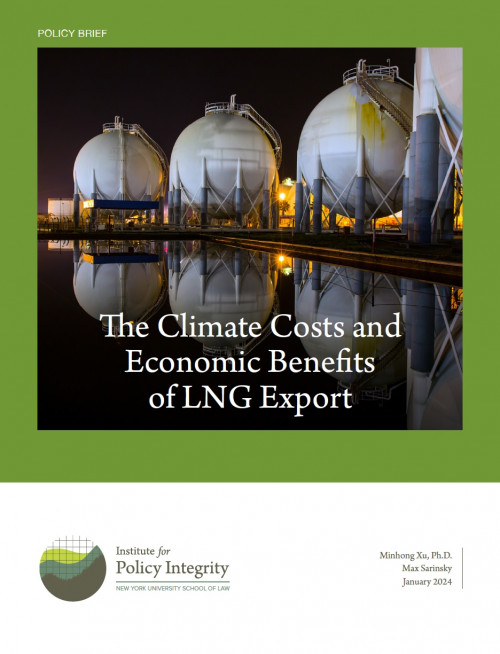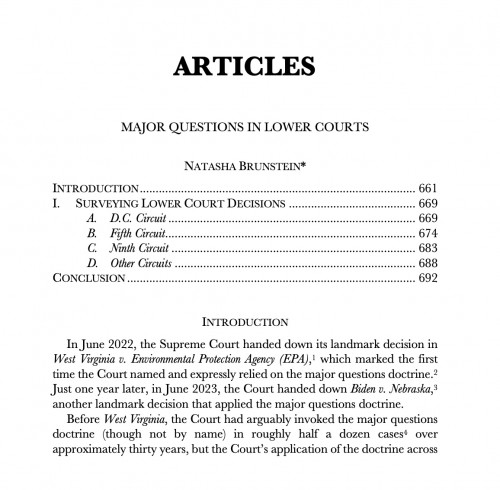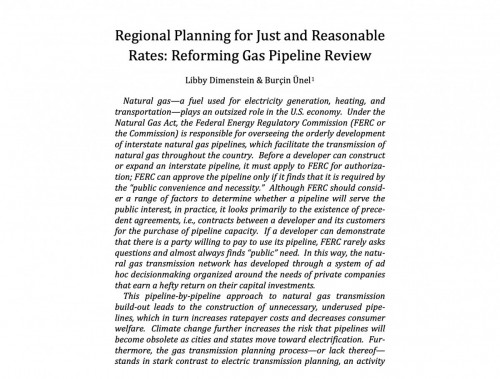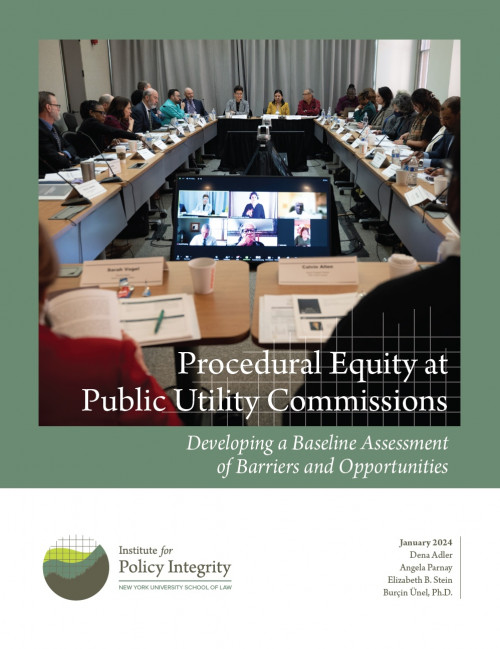-

The Climate Costs and Economic Benefits of LNG Export
Gas provides nearly a quarter of the world’s total energy supply. As part of that supply chain, gas is shipped between continents in the form of liquefied natural gas (LNG). The United States is now the world’s largest LNG exporter following a surge in gas exports since 2016, but these exports have generated controversy due to their climate effects.This policy brief provides an analysis to support an effort to balance the full range of impacts from LNG exports. Using DOE’s own published studies, we compare the climate cost per unit of LNG export to the economic benefit (measured using consumer welfare). We find that climate costs likely exceed economic benefits. While the precise difference depends on several factors, gross climate damages greatly exceed economic benefits under all scenarios evaluated. These findings provide useful insights as DOE prepares to re-evaluate the LNG export program.
-

Major Questions in Lower Courts
Published in the Administrative Law Review
In June 2022, the Supreme Court handed down its landmark decision in West Virginia v. Environmental Protection Agency (EPA), which marked the first time the Court named and expressly relied on the major questions doctrine. This Article surveys how lower federal courts have interpreted West Virginia and applied the major questions doctrine. There is no one major questions doctrine in the lower courts. Judges have taken vastly different approaches to defining and applying the doctrine both within and across circuits. These differences illustrate that many judges may view the doctrine as a little more than a grab bag of factors, which they seem to be choosing from at their discretion. Lower court judges do not appear to be constrained in how they apply the doctrine. In a majority of cases concerning Biden Administration agency actions and executive orders, judges applied the doctrine to reach outcomes that aligned with the political party of their appointing President.
-

Regional Planning for Just and Reasonable Rates: Reforming Gas Pipeline Review
Published in the Columbia Journal of Environmental Law
Natural gas plays an outsized role in the U.S. economy. Under the Natural Gas Act, the Federal Energy Regulatory Commission (FERC or the Commission) is responsible for overseeing the orderly development of interstate natural gas pipelines, which facilitate the transmission of natural gas throughout the country. FERC can approve the pipeline only if it finds that it is required by the “public convenience and necessity.” Although FERC should consider a range of factors to determine whether a pipeline will serve the public interest, in practice, it looks primarily to the contracts between a developer and its customers for the purchase of pipeline capacity. If a developer can demonstrate that there is a party willing to pay to use its pipeline, FERC rarely asks questions and almost always finds “public” need. This pipeline-by-pipeline approach to natural gas transmission build-out leads to the construction of unnecessary, underused pipelines, which in turn increases ratepayer costs and decreases consumer welfare. Climate change further increases the risk that pipelines will become obsolete as cities and states move toward electrification. Relying on economic theory, legal history, and policy analysis, we make the case in this paper—pulished in the Columbia Journal of Environmental Law— for FERC’s adoption of regional gas transmission planning.
-
Comments to CEQ on Phase One of the Environmental Justice Scorecard
The Council on Environmental Quality (CEQ) recently published Phase One of the Environmental Justice Scorecard (Scorecard), which evaluates federal agencies' progress on advancing the Justice40 Initiative, implementing and enforcing environmental and civil rights laws, and institutionalizing environmental justice. CEQ sought public feedback on the Scorecard’s usability and potential qualitative and quantitative metrics to improve future iterations of the Scorecard. The Institute for Policy Integrity submitted comments recommending several changes to enhance transparency, accountability, and comprehensiveness.
-

Procedural Equity at Public Utility Commissions
Developing a Baseline Assessment of Barriers and Opportunities
Combatting climate change will require major transitions in the energy sector. In the United States, state-level entities like public utility commissions play a key role in this transition. Commissions help decide where and when clean energy displaces fossil-fuel combustion, and how costs associated with energy system investments are passed on to consumers, so their actions can affect emissions outcomes as well as the health, energy, environmental, and affordability burdens faced by disadvantaged communities. Although many Commission processes incorporate some form of stakeholder input or participation, it is often difficult for the public to participate due to the technical and complex nature of these proceedings. These challenges present a procedural justice issue. In this report, we reviewed a range of practices for enhancing procedural justice at Commissions in nine states. This review was based on a structured survey of Commissions’ websites, resources available to prospective participants, and relevant statutes and regulations.
-
Amicus Brief in Challenge to Oil and Gas Permitting in Alaska
The Willow Master Development Plan is a proposed oil and gas development project in the National Petroleum Reserve in Alaska led by ConocoPhillips. In 2020, the Bureau of Land Management (BLM) approved the project for development. In 2021, the U.S. District Court for the District of Alaska vacated BLM’s approval of the Willow Project, but BLM prepared a supplemental environmental impact statement (SEIS) and subsequently re-approved the Project with fairly minor modifications. In March 2023, Plaintiffs challenged BLM's approval. We filed an amicus brief in the U.S. District Court for the District of Alaska in support of Plaintiffs to provide reasons supporting vacatur if the Court grants summary judgment to Plaintiffs. In January 2024, we filed our amicus brief in the U.S. Court of Appeals for the Ninth Circuit after the Plaintiffs appealed the district court's decision in favor of BLM.
-
Comments to FAA on Proposed Rule to Limit Orbital Debris
In September 2023, the Federal Aviation Administration (FAA) proposed a regulation that would require commercial space operators to limit or dispose of their launches’ orbital debris within 25 years. While the Proposed Rule and its accompanying regulatory impact analysis reasonably explain why orbital debris is a problem and why regulation will help address it, we explain in our comment letter that FAA should take further steps to bolster its analysis.
-
Policy Integrity Recommendations Reflected in Treasury’s Hydrogen Tax Credit Proposal
On December 22nd, the Treasury Department issued a notice of proposed rulemaking to implement the Inflation Reduction Act’s (IRA) 45V tax credit for clean hydrogen production. The proposal would establish rules for how electrolyzers can demonstrate compliance with the IRA’s lifecycle greenhouse gas limits—and thus demonstrate their eligibility for the tax credit. The proposed rule includes robust requirements to avoid greenhouse gas emissions: new clean power, annual matching with a transition to hourly matching in 2028, and contracting within the same regional grid. The approach in this proposal aligns with many of the recommendations the Institute for Policy Integrity made in comments to the Treasury Department.
-
Supplemental Comments to EPA on Reliability & the Proposed GHG Regulations for Fossil Fuel-Fired Power Plants
In May 2023, the Environmental Protection Agency (EPA) proposed a package of regulations to limit greenhouse gas emissions from fossil fuel-fired power plants under Section 111 of the Clean Air Act. EPA subsequently issued a supplemental notice of proposed rulemaking, re-opening its comment period and soliciting comment on whether to include additional mechanisms to address potential reliability issues. In these comments, we explain why EPA has engaged in reasoned rulemaking and developed a robust administrative record comporting with its mandate to reduce power sector pollution. It remains the Federal Energy Regulatory Commission’s (FERC’s) responsibility to ensure reliable bulk-power system (BPS) operations and to use its corresponding tools to address the wider reliability challenges of the clean energy transition, in coordination with other reliability-related entities.
-
Comments to EPA on Proposed Regulation of Trichloroethylene (TCE)
In October, EPA issued proposed restrictions on the manufacture, processing, and distribution of a chemical called trichloroethylene (TCE). We argue in comments that aspects of the agency’s Economic Analysis of the proposed restrictions could be clarified or expanded upon to better inform policymakers and the broader public about the benefits of ending TCE use.






